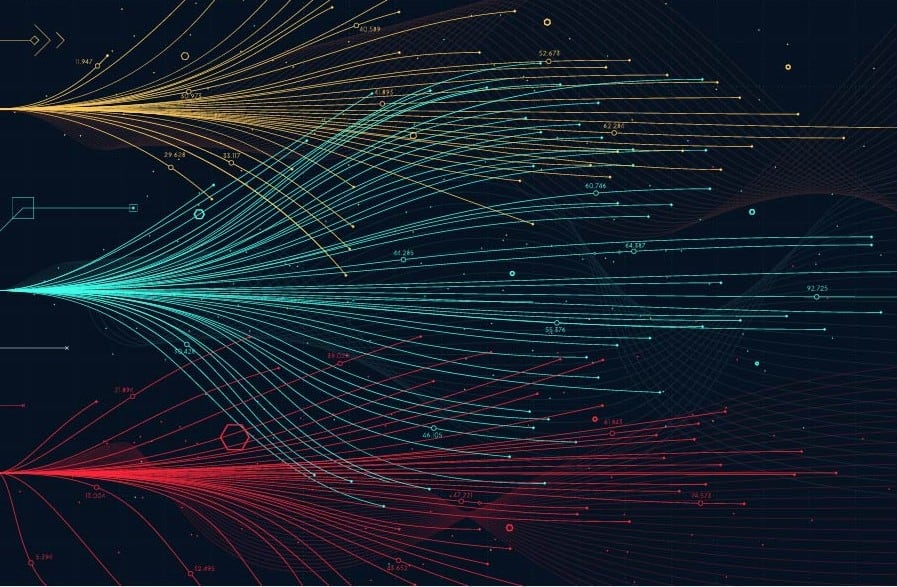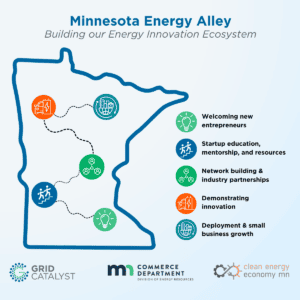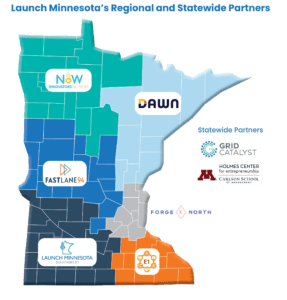As we emerge from an incredible moment of focus on climate change at the COP26 Conference in Glasgow, the world is determining a new path forward. Unprecedented commitments have been made by the public and private sector to address carbon and invest in the technology and infrastructure needed to act on climate. For Minnesota to leverage this moment of change, we will need to embody the state’s legacy of entrepreneurship and innovation, while also making this energy transformation more just and equitable.
Improving Equity and Access for Diverse Founders
Although many businesses and energy industry leaders are taking greater action to address systemic equity challenges, it is crucial that we also consider the unique needs and challenges for diverse founders and startups. Especially in the areas of energy, climate, and science, technology, engineering, and math (STEM). For example, the “Women Inventor Rate” is at an all-time high yet is still less than 15% of the overall patent-holders.
For entrepreneurs of color, they can face even bigger challenges in an already relentless business environment, including a lack of representation in funding and development partners, hard-to-access networks, and a lack of access to capital and funding. As it relates to the necessary capital to launch and grow the business, diverse founders are more likely to face racial bias, be denied credit, and are less likely to have access to generational and personal wealth that can enable entrepreneurial risk-taking.
For Grid Catalyst, we are committed to using our accelerator platform to address these systemic issues and to support the work of organizations that are already doing so much to support diverse founders and entrepreneurs. At the forefront of this work is the Center for Economic Inclusion, the nation’s first organization dedicated exclusively to advancing inclusive growth to achieve regional prosperity. Our program will be working in partnership with the Center to better understand the problems facing diverse founders, how those challenges may be unique to energy, climate, and our region, and how we can create greater equity and access in energy and climate.

There has also been a growing coalition of programs and funders working to shift the legacy of bias, underrepresentation, and access to resources for diverse founders. We hope to develop collaborative relationships with these organizations, in support of their existing platforms, and in exploration of ways to promote diverse founders in energy, climate, and STEM. This collective work will also elevate the diverse talent and innovation that is so critical to solving our climate challenges.
Clean Energy Economy Workforce Demographics
As we develop these partnerships and programs, we also need to consider the demographic profile of the clean energy workforce. The clean energy economy in Minnesota is one of the state’s strongest economic opportunities and a growing sector for new jobs and promising careers. According to the 2021 Clean Jobs Midwest Report, released by Clean Energy Economy MN, more than 55,300 Minnesotans worked in clean energy and energy efficiency in 2020. Despite the challenges of job loss in 2020, clean energy jobs rebounded twice as fast as overall state job growth last year. 71% of the clean energy businesses doing the hiring are small businesses with fewer than 20 people, highlighting the opportunity for startups in this sector and region.
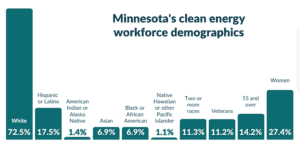
Looking more closely at the demographics, there are challenges and opportunities. In Minnesota, women make up nearly half of the labor force, but only 27.4% of the clean energy workforce is female. According to the National Association of State Energy Officials, the energy sector has below-average representation of Black or African American workers. Although, in Minnesota, the clean energy workforce has higher representation than the state overall employment at 6.9%. This is also true for Hispanic and Latinx workers who make up 17.5% of the clean energy workforce here.
However, these workforce numbers do not evenly translate to representation in other key areas of clean energy leadership, including ownership, c-suite positions, boards of directors, and venture capital and investor profiles. We believe these imbalances are caused by a myriad of issues, some of which are common to many other social, economic, and systemic racism issues. Others are unique to clean energy and science and technology careers. The end result is underrepresentation in clean energy leadership and startups, which in turn inhibits representation in clean energy development, economic opportunity, and mitigating the impacts of energy and environmental decision-making.
A key aspect of our work with the Center for Economic Inclusion will be diving deeper to understand the representation and challenges at the intersection of entrepreneurism and clean energy. We will be reaching out to partners with experience and expertise in these areas to better understand the issues, the demographics, and the opportunities to create impactful change.
Other Impact Platforms
Grid Catalyst was launched to advance clean energy innovation in Minnesota, in an effort to address the lack of market pathways for clean energy entrepreneurship and the challenges and opportunities facing our cold climate region. This foundational belief led us to develop our impact platform with two additional focus areas to elevate alongside our equity and access efforts:
- Transforming market pathways for northern climate technology
- Establishing an Energy Innovation Hub
Our 2022 demonstration cohort is the first major step toward our market transformation commitment, with the opportunity for late-stage startups to work with Minnesota’s energy leadership through our Innovators Network. The cohort startups will be announced in early 2022.
The Energy Innovation Hub will position Minnesota for success as we see exponential growth in energy and climate technology. We will build on our region’s momentum in clean energy and entrepreneurism by advancing programs and resources designed for energy and climate entrepreneurs and startups. The Innovation Hub will serve as a first-stop for startups to help them advance their idea or business through connection to startup grants, training in business and marketing acumen, mentorship through our network of experts, and investment opportunities with energy and climate-focused funders. Our platform will also spur creativity and collaboration with industry partners, promoting a culture of energy innovation and swift action on climate change.
Working in Partnership
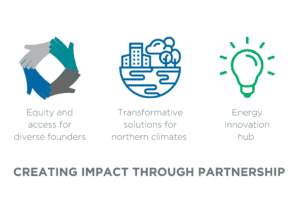
Our potential for impact depends on a community of partners working toward the same vision of a more just and equitable energy system. A system that is designed and implemented in collaboration with the communities who have the most potential for harm from climate change impact. A system that can be bettered through thinking creatively and demonstrating what’s possible. We have more momentum than ever in developing our future climate solutions. It is on us to be stewards of how we change and not just what we change. If you and your organization believe in that vision, we welcome you to join us in this work.


